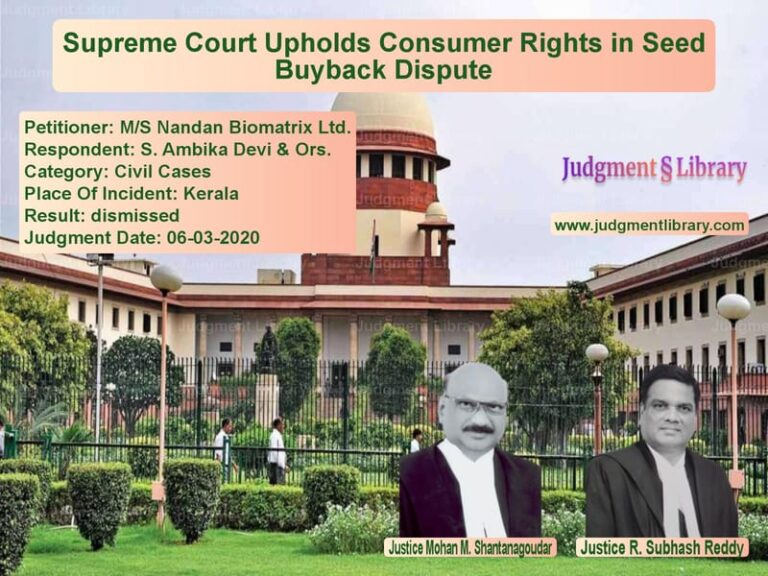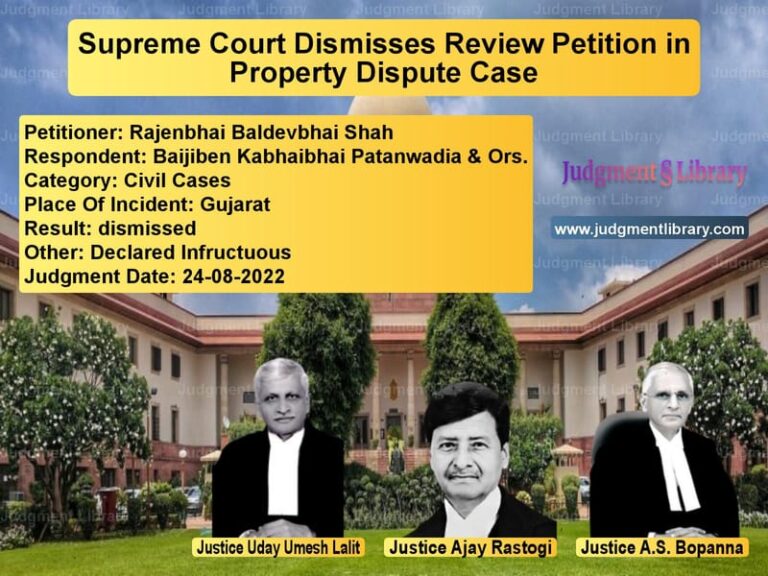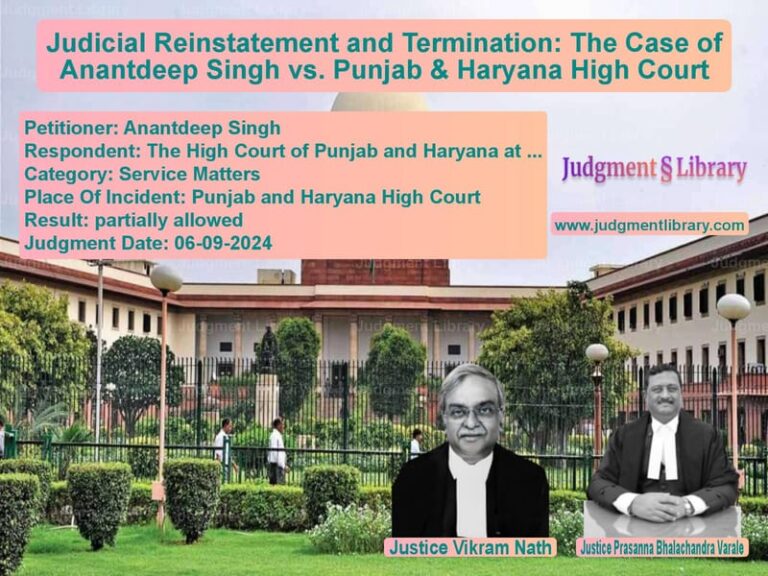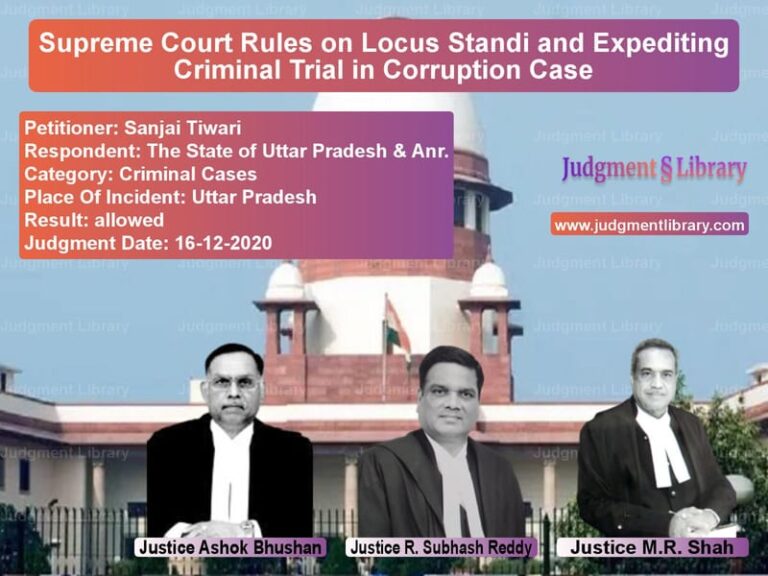Land Compensation Dispute: Supreme Court’s Verdict in Kalawati Wamanrao Gaikwad v. Regional Officer M.I.D.C.
Introduction
Land acquisition disputes often involve the question of fair compensation to the landowners, particularly when land is acquired for public purposes. The case of Kalawati Wamanrao Gaikwad (Died) Thr. LRS v. Regional Officer M.I.D.C. Latur & Ors. is one such dispute, where the Supreme Court addressed the issue of whether landowners were entitled to receive full enhanced compensation immediately or if conditions such as security should be imposed. The Court provided a balanced approach, ensuring that landowners received a portion of the compensation without restrictions while safeguarding the interests of the acquiring authority.
Background of the Case
The appellants, legal heirs of Kalawati Wamanrao Gaikwad, approached the Supreme Court after the High Court imposed a condition that the enhanced land compensation would only be released upon furnishing security. The landowners contended that they were unfairly being asked to meet an additional financial burden. The Supreme Court, while considering a previous decision in Civil Appeal Nos. 7070-7071 of 2015, modified the High Court’s order and allowed a portion of the compensation to be released without security.
Legal Issues Raised
- Should the enhanced compensation be disbursed immediately, or should security conditions apply?
- Was the High Court justified in imposing conditions on the landowners before releasing the compensation?
- How should courts balance the rights of landowners against the financial interests of the acquiring authority?
Arguments by the Appellants
- The High Court’s ruling imposed an unnecessary financial burden by requiring security for the entire enhanced compensation.
- The compensation had already been lawfully determined, and further conditions were unjustified.
- Previous similar cases had ruled in favor of immediate release, and their case should be treated accordingly.
Arguments by the Respondents (Regional Officer M.I.D.C.)
- Imposing security was necessary to protect public funds in case the compensation award was later revised or overturned.
- The High Court’s ruling was based on financial prudence and aligned with previous cases involving substantial compensation amounts.
- Allowing full release without security might complicate financial adjustments if the compensation amount was changed later.
Supreme Court’s Judgment
The Supreme Court modified the High Court’s ruling and directed that:
“50% of the enhanced compensation granted to the appellants shall be released without security whereas the balance of 50% shall be released to them on furnishing security to the satisfaction of the Reference Court.”
The Court also set aside the High Court’s order:
“The order(s) of the High Court is/are set aside and the appeals are allowed.”
Analysis of the Judgment
The Supreme Court’s decision sought to strike a balance between the landowners’ rights and the financial prudence exercised by the acquiring authority. By allowing 50% of the compensation to be released without security, the Court ensured that landowners were not unnecessarily deprived of their rightful compensation. At the same time, requiring security for the remaining 50% safeguarded the interests of the public exchequer in case of a future reduction in compensation.
Key Takeaways from the Judgment
- Immediate Partial Release: The ruling ensures that landowners receive at least half of the compensation without conditions.
- Protection of Public Funds: The Court upheld security requirements for the remaining amount to mitigate risks for the acquiring authority.
- Consistency in Judicial Approach: The decision aligns with previous rulings, ensuring uniformity in similar land compensation disputes.
Implications of the Judgment
The ruling has broad implications for land acquisition compensation matters:
- Landowners should not face unnecessary procedural hurdles in receiving compensation.
- Government entities can impose reasonable conditions to protect financial interests.
- Court rulings must ensure a fair and balanced approach in land acquisition matters.
Impact on Future Land Acquisition Cases
The judgment provides a precedent for future cases where landowners contest conditions imposed on compensation disbursement. It reaffirms that:
- Compensation should be disbursed in a timely manner.
- Security conditions should be applied only when necessary.
- Courts should ensure fairness for both landowners and acquiring authorities.
Conclusion
The Supreme Court’s ruling in Kalawati Wamanrao Gaikwad v. Regional Officer M.I.D.C. ensures that landowners receive a fair and reasonable portion of their compensation while safeguarding public funds. The decision strikes a necessary balance between the rights of landowners and the financial responsibilities of acquiring authorities, setting a clear precedent for future land acquisition cases.
Don’t miss out on the full details! Download the complete judgment in PDF format below and gain valuable insights instantly!
Download Judgment: Kalawati Wamanrao Ga vs Regional Officer M.I Supreme Court of India Judgment Dated 30-01-2017.pdf
Direct Downlaod Judgment: Direct downlaod this Judgment
See all petitions in Damages and Compensation
See all petitions in Judgment by Kurian Joseph
See all petitions in Judgment by A M Khanwilkar
See all petitions in allowed
See all petitions in Modified
See all petitions in supreme court of India judgments January 2017
See all petitions in 2017 judgments
See all posts in Civil Cases Category
See all allowed petitions in Civil Cases Category
See all Dismissed petitions in Civil Cases Category
See all partially allowed petitions in Civil Cases Category







